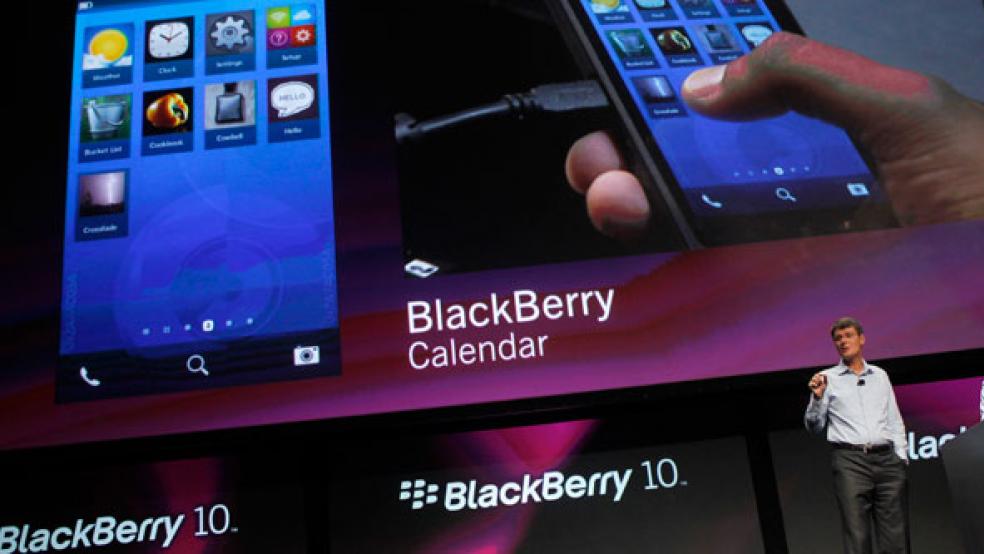BlackBerry, the beleaguered smartphone maker, said Monday that it had signed a “letter of intent agreement” to accept a $4.7 billion buyout offer from a consortium led by its largest shareholder, Canadian insurance company Fairfax Financial Holdings Ltd.
The $9-a-share private takeover isn’t necessarily a done deal, though.
Under the terms of the agreement, BlackBerry (NASDAQ: BBRY) will be allowed “to actively solicit, receive, evaluate and potentially enter into negotiations with parties that offer alternative proposals,” the company said in a statement. In other words, it can still go shop for a better offer until Nov. 4. If BlackBerry finds a better deal, it would have to pay Fairfax 30 cents a share, or more than $150 million. The termination fee would rise to 50 cents a share, or more than $260 million, if BlackBerry balks once a definitive agreement is signed.
Further clouding the picture: Fairfax, which already owns about 10 percent of BlackBerry’s common shares, still needs to line up financing to take its offer from the realm of the theoretical to the actual. Given BlackBerry’s precarious financial situation, that might not be easy.
“It is quite unusual to announce any acquisition like this, let alone without financing,” writes Steven Davidoff, the “Deal Professor” at The New York Times’s DealBook. “Most targets would require a commitment letter from banks that make financing more certain…. In this case, the best Fairfax could do was say that it was ‘seeking’ financing from Bank of America Merrill Lynch and BMO Capital Markets. So am I.”
If a bidding war doesn’t emerge and Fairfax’s deal falls apart, the best that BlackBerry may be able to do is to sell its intellectual property. That may be worth at least $1 billion, according to a note from BMO Capital Markets cited by Bloomberg News.
Though the company has no debt, it can certainly use the money from a sale of intellectual property. Bloomberg notes that BlackBerry has cash and cash equivalents of $2.6 billion, down from $3.1 billion in the previous quarter. Some analysts have argued that BlackBerry’s best hope is for it split itself up.
Selling or licensing patents has been the go-to move for struggling technology companies for years. Eastman Kodak, whose film documented the 20th century before the company went into a long decline, struck a $525 million deal with a slew of technology companies such as Google and Apple in 2012. The sale was for a fraction of the $2.6 billion the company had hoped to get. Microsoft acquired AOL’s patents for $1 billion in 2012, which helped bolster the media company’s balance sheet. Nortel, which is currently mired in bankruptcy, unloaded its patents for $4.5 billion in 2011 to a consortium of companies led by Apple.
A BlackBerry spokesperson declined to comment about the possible sale of intellectual property, referring a reporter to statement it issued in August about its plans to pursue strategic alternatives including “possible joint ventures, strategic partnerships or alliances, a sale of the Company or other possible transactions.”
Shares of BlackBerry fell 17 percent Friday after the company warned that it will post a loss of nearly $1 billion for the quarter ended August 31. BlackBerry also announced plans to slash 4,500 jobs – about 40 percent of its workforce – and take a write-down of up to $960 million because of unsold Z10 smartphones. BlackBerry’s new CEO Thorsten Heins launched the Z10 earlier this year, and though the device got some good reviews, it failed to attract much interest from customers. In fact, quarterly sales fell to their weakest levels in six years.
BlackBerry, whose keyboard-enabled smartphones were once so ubiquitous that they were dubbed “crackberries,” is trying to reinvent itself as a much smaller company servicing large enterprise customers rather than the consumer market.
This strategy, which IBM among others have adopted, may have potential because it focuses on a higher margin business, but it comes years too late. Many of the large businesses that built their businesses on the BlackBerry network have moved to the more popular Apple iPhone and Google Android devices. Those that remain with BlackBerry appear eager to leave, with many companies that once preferred the security of BlackBerry phones now allowing their employees to choose their own device.
The iPhone has even captured 58 percent of members of the House of Representatives, according to a new survey by NBC’s “Meet the Press.” Just 23 percent of representatives still use BlackBerries.
BlackBerry, though, continues to have a subscriber base topping 72 million, though that number has been declining. As Bloomberg notes, the latest market share data shows the company ranks fourth with a tiny 2.9 percent share. Since few people want BlackBerry’s hardware and software, its future certainly seems bleak. Monday’s announced deal did little to change that.




